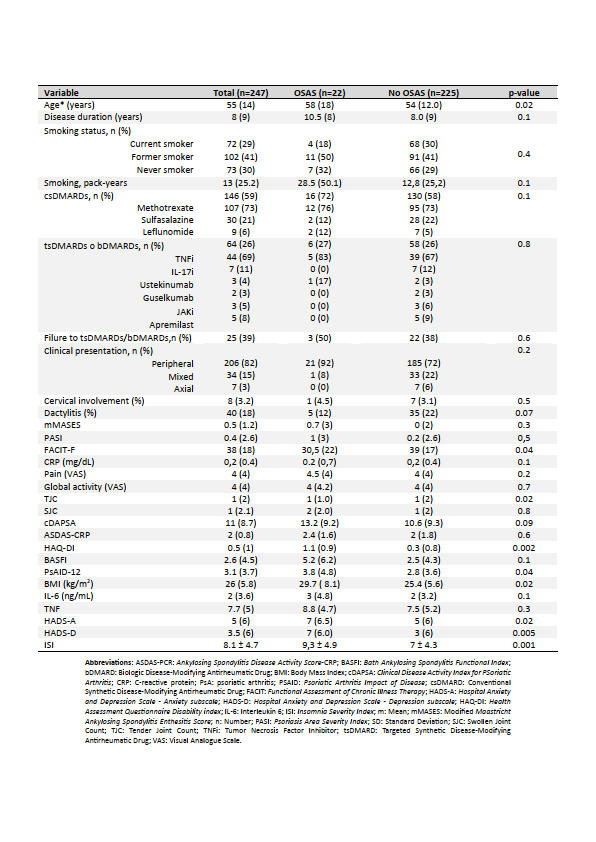Session Information
Session Type: Poster Session C
Session Time: 10:30AM-12:30PM
Background/Purpose: Obstructive sleep apnea syndrome (OSAS) is a chronic respiratory disorder characterized by intermittent upper airway collapse during sleep. This mechanism can trigger systemic inflammation and metabolic dysregulation. Psoriatic arthritis (PsA) is associated with metabolic syndrome and emotional disorders, both of which are classic comorbidities of OSAS. Given the established relationship between PsA and metabolic syndrome, an association between PsA and OSAS would be expected; however, no studies to date have explored this potential relationship.Therefore, the aim of this study was to evaluate the presence of OSAS and its association with clinical, inflammatory, and functional features, as well as sleep quality in a cohort of PsA patients.
Methods: A cross-sectional observational study was conducted with 247 PsA patients, classified according to the presence (n=22) or absence (n=225) of OSAS. Demographic, clinical, functional, disease activity, functional impairment, disease impact, sleep quality, and comorbidity variables were collected. Logistic regression analysis was performed to identify factors associated with OSAS.
Results: Patients with OSAS had a higher mean age (58 vs. 54 years; p=0.02) and higher body mass index (BMI) (29.7 vs. 25.4 kg/m²; p=0.02). Regarding inflammatory parameters, they exhibited greater disease activity (DAPSA 13.2 vs. 10.6; p=0.09) and a higher number of enthesitis sites according to mMASES (0.7 vs. 0.0; p=0.3), although not reaching statistical significance. Functionally, OSAS patients showed significantly greater impairment according to the HAQ-DI (1.1 vs. 0.3; p=0.002) and greater disease impact (PsAID-12: 3.8 vs. 2.8; p=0.04). They also presented higher levels of fatigue (FACIT-F: 30.5 vs. 38; p=0.04), anxiety (HADS-A: 7 vs. 5; p=0.02), depression (HADS-D: 7 vs. 3.5; p=0.005), and worse sleep quality (ISI 9.3 vs. 7.0; p=0.001). In logistic regression analysis, BMI was the only variable significantly associated with OSAS (OR: 1.1; 95% CI: 1.01–1.2; p=0.04).
Conclusion: OSAS was associated with obesity, greater functional impairment, higher levels of fatigue, anxiety, depression, and poorer sleep quality in PsA patients. These findings highlight the importance of early detection strategies for comorbidities and a multidisciplinary approach in the assessment of PsA patients, including evaluation for OSAS.
To cite this abstract in AMA style:
Toledano E, Chacón C, Hidalgo Calleja C, Miguel B, Blanco L, Turrión A, Compán O, Martín M, Gómez S, Montilla C. Obstructive Sleep Apnea Syndrome in Patients with Psoriatic Arthritis and Its Relationship with Disease Activity and Comorbidities [abstract]. Arthritis Rheumatol. 2025; 77 (suppl 9). https://acrabstracts.org/abstract/obstructive-sleep-apnea-syndrome-in-patients-with-psoriatic-arthritis-and-its-relationship-with-disease-activity-and-comorbidities/. Accessed .« Back to ACR Convergence 2025
ACR Meeting Abstracts - https://acrabstracts.org/abstract/obstructive-sleep-apnea-syndrome-in-patients-with-psoriatic-arthritis-and-its-relationship-with-disease-activity-and-comorbidities/

